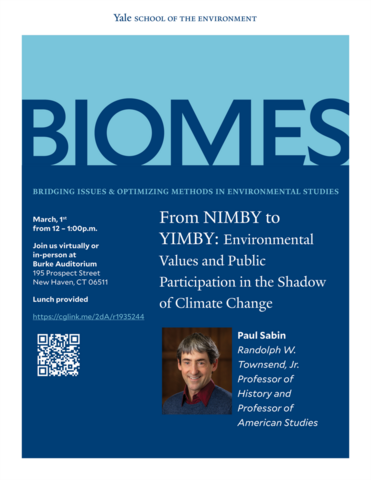Event time:
Wednesday, March 1, 2023 - 12:00pm
Location:
Online via Zoom, and Burke Auditorium (195 Prospect Street)
Event description:
Public participation and environmental review have been celebrated for decades in the United States as effective democratic tools to protect the environment and local communities. Yet they now face spirited criticism.
Where previous attacks on laws like the National Environmental Policy Act (NEPA) were typically mounted by conservative skeptics and frustrated businesses, the new criticism comes from inside the liberal house. A generational shift is underway in how American liberals see the balance between government power and the rights and roles of local citizens and communities. NIMBY (or Not-in-My-Backyard) opponents of development are blamed for the inadequacy and scarcity of affordable housing, mass transit, and renewable energy infrastructure. The solution: YIMBY (or Yes-in-My-Backyard) policies, including reform of participation and review standards, to accelerate project approvals and weaken opposition.
NEPA and similar state environmental laws, according to the new liberal critics, reinforce a problematic status quo by weakening government capacity to act, preventing effective responses to climate change and other urgent concerns. Community input and public participation mandates, from this vantage point, are seen as undemocratic, rather than inclusionary, because they shift power from broadly elected representatives to self-selecting, and often narrowly self-interested, local advocates.
Paul Sabin’s talk, “From NIMBY to YIMBY,” will discuss the history of environmental review and public participation in the United States to show what today’s conflicts reflect about how environmental problems are defined, which concerns are increasingly paramount, and what kinds of solutions are favored.
Paul Sabin is the author of Public Citizens: The Attack on Big Government and the Remaking of American Liberalism and The Bet: Paul Ehrlich, Julian Simon, and Our Gamble over Earth’s Future. He is the faculty director of the Yale Environmental Humanities Program.
Admission:
Free
Open to:
General Public
